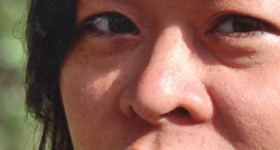In the Excelsior neighborhood of San Francisco, a group of about
15 Filipino caregivers are seated in a bright yellow room at the Filipino
Community Center, chatting animatedly in Tagalog.
This training is part of the Caregiver Research (CARE) Project, a
grassroots effort that supports caregivers, who assist the elderly, adults
with mental or physical disabilities and those suffering from other chronic conditions. The project aims to empower the caregivers to find viable
solutions for a work force that is often ignored and highly unregulated,
which leads to gross violations of these workers’ rights, safety and health.
The next item on the agenda is to share testimonials from their experiences as caregivers. At first, there is only the sound of weight being
shifted in fold-up chairs.
Tentatively and softly, one woman speaks up in Tagalog. “When I lived
in the Philippines, we had maids, so I didn’t really know how to clean a
bathroom, or how powerful bleach was. I hurt my hands. My bosses asked,
’Don’t you have to do this back at home?’ And the truth was, I didn’t. I
thought America was supposed to be so good. But everything is so hard.”
People nod in agreement. One man speaks of the bodily injuries endured and the life-threatening skin disease he contracted from a patient.
Another, Florentino Atangan, reports that even though he successfully
sued his employer for wage theft — having worked 14- to 16-hour days,
seven days a week, for several years without overtime pay — the employer still has not paid the $40,000 settlement. The group discusses rallying
outside the employer’s building downtown. (The CARE Project prefers its
members be anonymous in this article for the protection of their current
employment, except for Atangan, whose case is public.)
Over a 4-month period, sociology professors Robyn Rodriguez and
Valerie Francisco, who both have backgrounds in activism and organizing,
will train the group to conduct research by interviewing other caregivers, in hopes of obtaining a deeper and more nuanced understanding of
how caregivers are treated by their employers. They also hope to better
understand their work conditions, hours and wages. The group will then
identify common problems and issues to focus their search for solutions.
The project is a form of participatory action research, in which typically powerless groups do research for their own benefit, while serving
a dual purpose of boosting personal confidence and building a sense of
community in the process. “If we’re the ones experiencing this work, then
we’re the experts, and we must know the best solutions,” one man in the
group says. “We can’t wait for the grace of God, our employers or the
professors to find them.”
The Help
The need for caregivers and domestic workers (which
includes nannies and housekeepers) is on the rise, with
one American turning 65 years old every eight seconds
and the elderly population projected to reach 71 million
in 2030. But these industries lack an infrastructure of rights and regulations, and attract many undocumented workers as a result.
Unlike other low-wage jobs, care work is excluded from federal labor laws and domestic protections. The Occupational Safety and Health Act does not cover unsafe or hazardous work conditions for domestic workers, and they are denied collective bargaining and labor rights. While
some caregivers are hired by third-party staffing agencies to work in elder homes or centers, others work and sometimes live in private homes. The federal Fair Labor Standards Act that guarantees overtime pay and
a minimum wage does not apply for domestic service and caregivers
who work for private employers.
“The classifications of workers are understood differently at different
levels,” Rodriguez says. “The workers industry is so broad, and laws do
not define every type.” Caregivers who work in one-on-one situations
in private homes are technically classified by the law as “companions”
and remain unprotected by the law. “They’re not just sitting with them
and playing cards,” Rodriguez says, objecting to the term “companion.”
“In reality they are feeding, bathing and dressing them and giving them
medicine. It is a real job.”
There are over 2 million domestic workers in the United States without
legal protections, with the exception of New York, the only place
where a Domestic Workers’ Bill of Rights exists. Care work can be very
physically demanding, but businesses are not mandated to provide
worker benefits or workers’ compensation. Just 21 states have policies
guaranteeing a minimum wage for these workers, but it is widely unenforced.
Caregivers are also unlikely to protest abuses,
Rodriguez says, given the troubled economy or their immigrant
status.
“It’s not even under-the-table payment because
there’s no law against it,” CARE Project facilitator Mario
de Mira says. “The way the system is set up encourages
taking advantage of these workers.”
“There’s a deep lack of respect for this work force,”
says Ai-Jen Poo, director of the National Domestic
Workers Alliance (NDWA), based in New York City. “It’s embedded in our culture. It’s associated with women, and
women of color, all the way back to African American
slave women.” Poo believes it is important to shed this
severely outdated view of domestic work and care, and
to “bring the work force into the 21st century. This work
makes it possible for everyone else to go to work.”
Though many perceive domestic work and caregiving to consist mostly
of Latina and black women, increasing numbers of Asian American and
Pacific Islander women are entering this service sector. Although accurate
numbers are hard to come by, the number of Asians and Asian Americans
in care work is probably undercounted, according to the NDWA.
Workers come in large numbers from the Philippines (where many
were trained as nurses but find limited opportunities here), Nepal, India,
Bangladesh, Pakistan, Tibet and other South Asian countries. More
Chinese workers are also becoming caregivers, due in part to the widespread
decline of the domestic garment industry that employed many of
them previously. Many Filipinos in California shifted into caregiving after
mass layoffs followed the federalization of airport screening jobs.
With movies like The Help bringing attention to domestic work,
organizations like the NDWA and the Filipino Community Center are
hoping to get the public thinking about how we treat “the help” today in
order to increase awareness and heighten the value of domestic work
and caregiving.
“We want to make this work visible,” Poo says. “Despite being one of
the fastest-growing work forces, the work is undervalued, and it is one of
the most vulnerable to poor conditions.”
The Never-Ending Workday
Caregivers and domestic workers face a wide
variety of on-the-job abuses, ranging from daily
indignities like verbal insults, intimidation and
wage theft to extreme cases of domestic slavery,
where workers are trafficked, have their
mobility and freedoms restricted and passports
confiscated. Other examples of more subtle
abuses include talking down, late payments and working longer than
eight-hour shifts with no breaks.
“There is a lack of respect and understanding that this is a ’real job,’ ”
Poo says. “Often, the workers must choose between taking the abuses in
a disrespectable job or not being able to support themselves and families.”
Especially for those who work in home-based settings, employers
can often fail to delineate what is and is not work; the workday potentially
never ends for live-in caregivers. “They may be asked to do work beyond care like housecleaning or home maintenance, which
should be done by other kinds of workers,” Rodriguez says.
Sexual abuse is also an issue. Up to 90 percent of the
domestic work force is female, according to Poo, and they
are vulnerable to violence by aggressive and abusive bosses.
Work with Dignity
Advocates are currently fighting for the passage of a Domestic Workers
Bill of Rights in California, similar to the one in New York, which sets out
basic standards including the right to a minimum wage and support for
injuries on the job for domestic workers and in-home caregivers. The
hope is to build a framework for federal legislation in home care and for
2 million new, regulated jobs to be created, “dignified and quality jobs
people can support their families on, with a path to citizenship,” Poo says.
It is a multipronged approach — working toward both state and national
policy change in hopes that each will influence the other. “The
elderly, those with disabilities, no one is getting a fair deal,” Poo says.
“We are trying to bring people together to create a country that cares
and recognizes all work with dignity.” Poo’s work with the Caring Across
Generations campaign is convening local dialogues across the country
on these issues, bridging conversations between those in need of care
and those who give it.
At a meeting of the CARE Project two months later, the caregiver
group is generating potential interview questions by examining topics
that came up in their own stories, and figuring out the most fluid order of
questions to coax their subjects to share personal stories.
“This is so different from my PhD students,” Rodriguez says. “This
is truly anchored in experience, so they know what questions to ask.
And it’s peer research.” The meeting involves performing skits of common
miscommunications between bosses and workers, and improvising
resolutions. Already the workers carry more confidence and are eager
to share their experiences. The hope is to develop a plan of action once
the training is over, perhaps bring in a new cohort, and even start their
own organization.
At the end of the meeting, a caregiver is surprised with a birthday
cake from the group, and a karaoke machine is set up. With many of
these caregivers isolated from their families back in the Philippines and
living alone, the scene changes from training to family party. Filipino
songs play through the speakers, and the caregivers, after working long
hours, now have a space to sing.
Nicole Wong is a contributing editor for Hyphen. She last wrote about the Hollaback
movement against street harassment.
What are the "push factors" for Filipinos to leave their homes to work abroad in unregulated industries such as caregiving and domestic work? Professor Robyn Rodriguez explains.










Comments